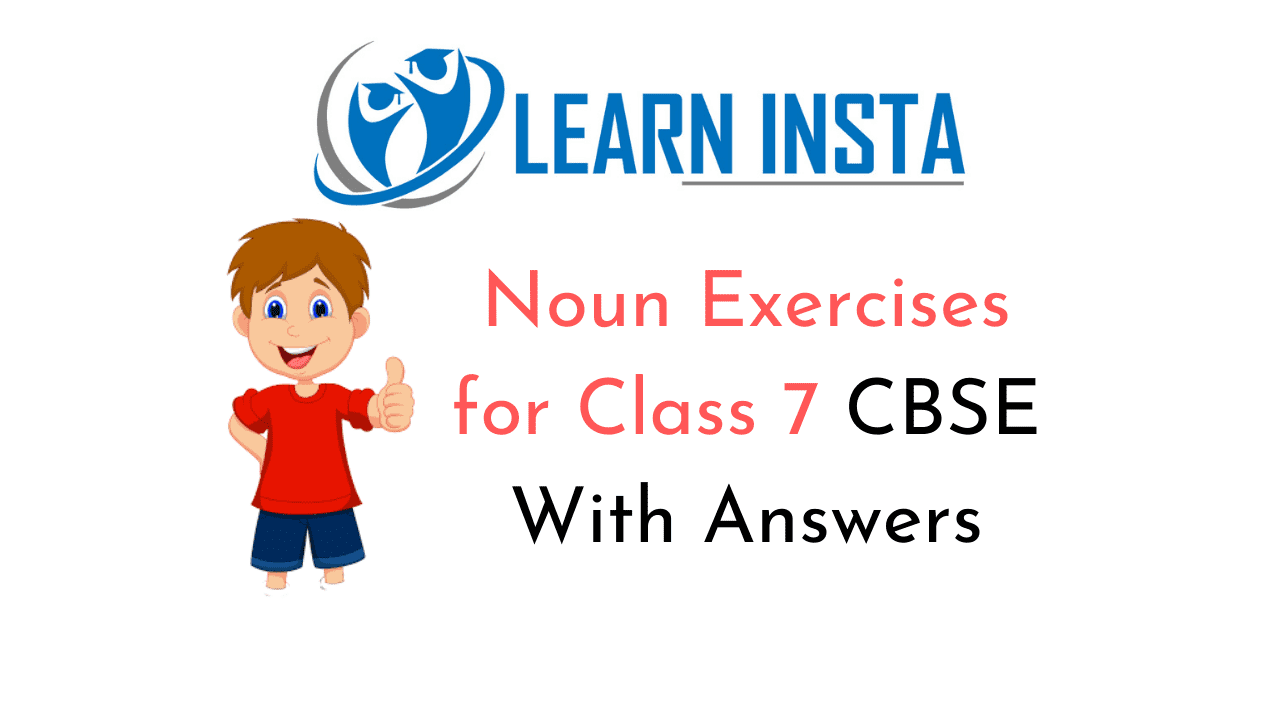Noun Exercises for Class 7 CBSE With Answers Pdf
Definition: A noun is a part of speech that is used to name a person, place, thing, quality, or action. Examples: Mango, girl, boy, cat, etc.
This grammar section explains English Grammar in a clear and simple way. There are example sentences to show how the language is used. You can also visit the most accurate and elaborate NCERT Solutions for Class 7 English. Every question of the textbook has been answered here.
Types of Noun
Common noun:
It does not name any particular person, place or a thing. It speaks in general about persons, places or things of the same kind.
Examples:
- The boy kicked the ball.
- The bag is lying under the table.
Proper noun:
It names a particular person, place or a thing.
Examples:
- Virat Kohli lives in India.
- Barack Obama lives in America.
Concrete noun:
A noun that denotes a material object rather than an abstract quality, state or action.
Examples:
- Dog, building, tree
Abstract noun:
It names a feeling or a state of being which has no form or shape and which cannot be seen or touched, but whose existence we can recognise.
Examples:
- A thing of beauty is a joy forever.
- Perseverance leads to success.
Collective noun:
It names a group or a collection of people or things taken together and treated as one.
Examples:
- Radhika gave me a bunch of flowers.
- The pride of lions was asleep.
Countable noun:
A noun which can be counted is called a countable noun. So countable nouns can either be singular or plural. Some common nouns and collective nouns belong to this category.
Examples:
- one girl, many girls, a herd of elephants
Uncountable noun:
A noun which cannot be counted is called an uncountable noun.
So it is neither singular nor plural. Some common nouns and abstract nouns belong to this category.
Examples:
- some rice, much happiness
Gender Nouns:
The Gender of a noun indicates whether it is male or female.
For Examples::
- boy, girl, hero, heroine, lion, lioness, etc.
- A noun that denotes a male is called Masculine Gender.
Masculine nouns are the words for men, boys and male animals.
Examples::
- Boy – Lion – Bull – Dog
A noun that denotes a female is called Feminine Gender. Feminine nouns are the words for women, girls and female animal.
Examples:
- Book – Pen – Room – Tree
Number Nouns:
There are two types of nouns on the basis of number: Singular Noun and Plural Noun
Singular Noun:
When we speak about one person and one thing, we use the noun in singular form. Single means one.
Examples:
- a. A man is walking within the premises.
- b. A group of cows is called a herd.
- c. A monkey can climb trees faster than you.
- d. Temple is the worshipping place of Hindus.
- e. This table is made of wood.
In these sentences, the nouns- man, group, monkey, temple and table are in singular forms.
Plural Noun:
When we speak about more than one person or thing, we use the noun in plural form.
Examples:
- a. Few women are standing in the temple.
- b. The groups of cows, coming back to their sheds, are not milch cows.
- c. These tables are made of plastic.
- d. Children should be given proper guidance.
- e. Keep the guns in a safe place.
In these sentences, the words women, groups, tables, children and guns are plural- nouns.
Possessive Case:
When a noun or a pronoun is used to show ownership or possession, authority, origin, kind etc., it is called Possessive Case.
Examples:
- This is Rohit’s bike.
When the noun is Singular, the Possessive Case is formed by adding apostrophe S (‘S) at the end and when the noun is plural and end in ‘S’, we add apostrophe after ‘S’ (‘S).
Examples:
| Singular | Possessive | Plural | Possessive |
| Boy | Boy’s | Boys | Boys’ |
| Book | Book’s | Books | Books’ |
| Girl | Girl’s | Girls | Girls’ |
| Man | Man’s | Men | Men’s |
| Our | Ours | Women | Women’s |
| My | Mine | Parents | Parents’ |
| You | Yours | ||
| 80 | 80s’ | ||
| 2009 | 2009’s | ||
| It | Its | ||
| Who | Whose |
Apostrophe or no apostrophe if the noun ends in ‘s’.
When a proper noun ends in s, the possessive form can be made either by adding an apostrophe and an ‘s’ or only an apostrophe.
Examples:
- This is a portrait of the King Charles’s wife. / This is a portrait of the King Charles’ wife.
- My uncle James’s factory was burnt down last night. / My uncle, James’ factory was burnt down last night.
Two possessive nouns one after the other
Sometimes, two possessive nouns appearing one after the other may be necessary to indicate double ownership.
Examples:
- She is Rohit’s brother’s girlfriend.
- This is Sonika’s father’s car.
Apostrophe indicates joint ownership
When two nouns are joint owners of something, only the second noun is in the possessive form i.e. an apostrophe and ‘s’ is added at the end of second noun.
Examples:
- On that hill is Jack and Jill’s house. (The house belongs to both Jack and Jill.)
- Sonali and Sonali’s mother are doctors.
Compound possessive nouns
If it is a hyphenated compound noun, add the apostrophe s (‘s) to the last word.
Examples:
- My brother-in-law’s car hit a truck the other day.
Noun Exercises Solved Examples for Class 7 CBSE
Exercise – 1
Read the statement given below and tick the correct option:
Question 1.
They gazed across valley.
(a) across
(b) gazed
(c) they
(d) valley
Answer:
(d) valley
Question 2.
I believe in his honesty.
(a) believe
(b) honesty
(c) lin
(d) I
Answer:
(b) honesty
Question 3.
My family supports me.
(a) family
(b) My
(c) supports
(d) me
Answer:
(a) family
Question 4.
Taj Mahal is a sign of love.
(a) love
(b) Taj Mahal
(c) sign
(d) is
Answer:
(b) Taj Mahal
Question 5.
Moon shines at night.
(a) Moon
(b) shines
(c) at
(d) night
Answer:
(a) Moon
Question 6.
We need peace in our state.
(a) our state
(b) we
(c) peace
(d) need
Answer:
(c) peace
Question 7.
How many students in your class?
(a) class
(b) many
(c) students
(d) your
Answer:
(c) students
Question 8.
He was reading a newspaper.
(a) He
(b) reading
(c) a
(d) newspaper
Answer:
(d) newspaper
Question 9.
Honestly is best policy.
(a) policy
(b) honestly
(c) is
(d) best
Answer:
(b) honestly
Question 10.
Children broke window pane.
(a) Children
(b) broke
(c) window
(d) paiìe.
Answer:
(a) Children
Exercise – 2
Use capital letters for Proper Nouns in the following sentences.
1. ms brown told me that paris is the capital of france.
____________________________________
2. william Shakespeare was a famous English author.
____________________________________
3. ‘war and peace’ was written by leo tolstoy.
____________________________________
4. jack and jill had so much fun at disney park.
____________________________________
Exercise – 3
Identify which of the following are common noun, proper noun, collective noun and abstract noun.
Questions:
1. Always speak the truth.
2. Honesty is the best policy.
3. King Solomon was famous for his wisdom.
4. A committee of five was appointed.
5. He gave me a bunch of grapes.
6. London is on the river Thames.
7. Cleanliness is next to godliness.
8. Wisdom is better than riches.
9. I recognized his voice at once.
10. Our team is better than theirs.
Answer:
1. truth: abstract noun
2. honesty: abstract noun, policy: abstract noun
3. King: common noun, Solomon: proper noun, wisdom: abstract noun
4. committee: collective noun
5. a bunch: collective noun, grapes: common noun
6. London: proper noun, river: common noun, Thames: proper noun
7. cleanliness: abstract noun, godliness: abstract noun
8. wisdom: abstract noun, riches: abstract noun
9. voice: abstract noun
10. team: collective noun
Exercise – 4
Complete each sentence by choosing the correct word from the bracket
1. There is so (many, much) smoke coming out of the chimney.
_____________________________________________
2. Mrs. Dhawan keeps (plenty of, a large amount of) tropical fish in her pond.
_____________________________________________
3. Mr. Arora takes only a (little, few) minutes to shave.
_____________________________________________
4. The postman put (a great deal of, a lot of) letters into the bag.
_____________________________________________
5. He threw (much, some) stones at the monkeys.
_____________________________________________
6. She uses only (a few, a little) cooking oil in her cooking.
_____________________________________________
7. My hens lay (a large amount of, several) eggs every morning.
_____________________________________________
Internal Assessment
Read the noun on the candy. Use the colour code to color the candy.
Color code – person–red, place – purple, thing – pink.
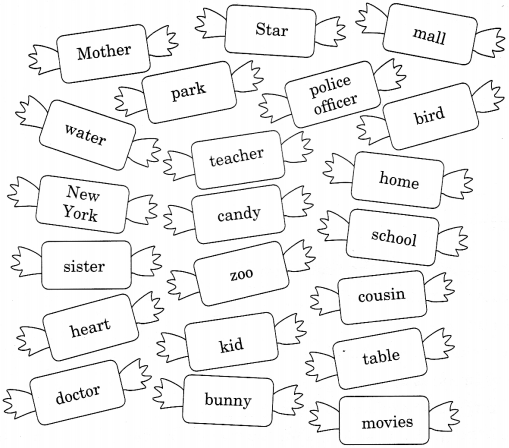
Answer:
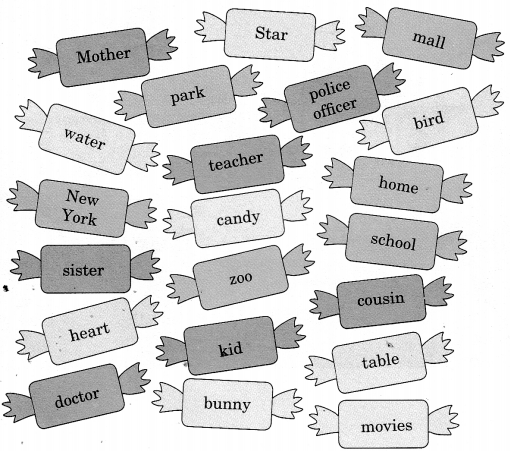
Noun Exercises Practice Examples for Class 7 CBSE
1. Write each noun in a box on the correct side. Remember to begin each proper noun with capital letters.
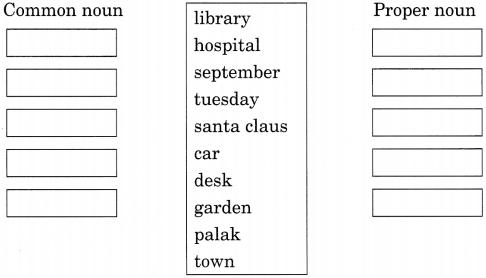
2. Write a sentences with each noun listed below.
(i) Pencil _________
(ii) Flower _________
(iii) Book _________
(iv) Garden _________
(v) Country _________
3. Common nouns Exercises: Name the professionals
(i) One who operates on sick people is a _________
(ii) One who cuts hair is a _________
(iii) One who makes chairs and tables is a _________
(iv) One who makes bread is a _________
(v) One who sells medicines and drugs is a _________
4. Two fisherman are fishing. One is looking for proper noun fishes and another is looking for common noun fishes. Can you help them?
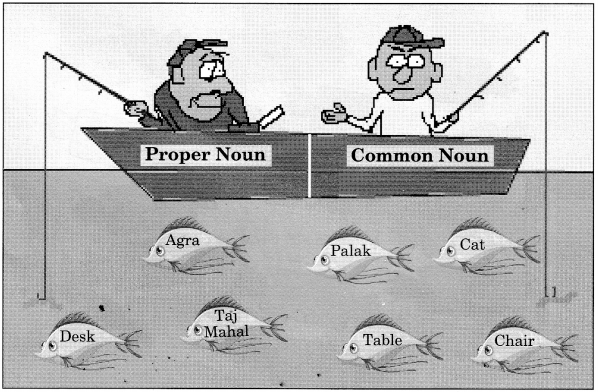
CBSE Class 7 English Grammar
- Sentences Exercises Class 7
- Tenses Exercise Class 7
- Noun Exercises For Class 7
- Pronoun Exercise For Class 7
- Adjectives Exercises For Class 7
- Adverb Exercises For Class 7
- Subject Verb Agreement Exercises For Class 7
- Preposition Exercise For Class 7
- Conjunction Exercise For Class 7
- Interjections Exercises For Class 7
- Active And Passive Voice Exercises Class 7
- Reported Speech Exercises Class 7
- Modals Exercises for Class 7
- Integrated Exercises
